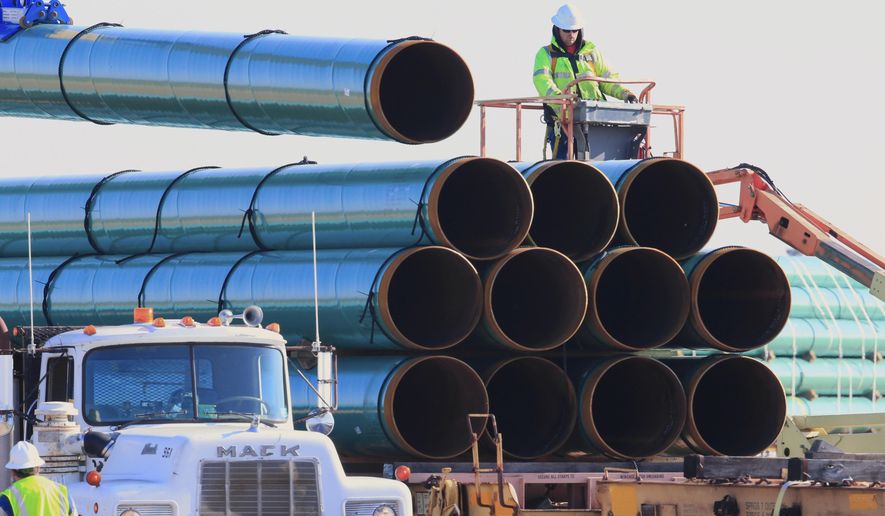The nation may be awash in oil and natural gas, but U.S. pipelines are running on fumes after three high-profile conduits ran aground in 24 hours, the victims of Obama-appointed judges and regulatory uncertainty under the possibility of a climate-woke Biden presidency.
In this week’s triple whammy, a federal judge ordered the 3-year-old Dakota Access Pipeline to empty pending an environmental review. The Keystone XL pipeline, still under construction, was further delayed after the Supreme Court upheld a lower-court order blocking a permit.
Despite winning a Supreme Court case last month, Dominion Energy and Duke Energy stunned the industry by abandoning after six years the proposed Atlantic Coast Pipeline, citing the “increasing legal uncertainty that overhangs large-scale energy and industrial infrastructure development in the United States.”
Environmental activists gushed over the historic three-fer, raising the possibility that the Dakota Access and Keystone XL pipelines could be erased next year by a Biden administration, while Energy Secretary Dan Brouillette blasted the “well-funded obstructionist environmental lobby” for killing the Atlantic Coast project.
The decisions were “more reminders that activist judges and special interest litigants are determining the fate of our national and energy security,” Mr. Brouillette said. “These developments should be deeply concerning for every American at every socio-economic level.”
The rulings show that the U.S. pipeline infrastructure has become the soft target for environmental groups seeking to bring down the fossil fuel industry and replace it with renewable energy in the name of fighting climate change.
“To avoid the worst impacts of the climate crisis, our companies must transition away from the use of fossil fuels,” said Lila Holzman, energy program manager of As You Sow. “Building more gas infrastructure now without a clear justification is a recipe for stranded assets.”
The Sierra Club hailed the cancellation of the $8 billion Atlantic Coast project as a “monumental, historic victory and will have far-reaching implications,” a “watershed moment in the fight for climate action” and “another indicator of the end of fossil fuels.”
Rep. Dan Crenshaw, Texas Republican, called that view ironic, given that the nation leads the world in reducing greenhouse gas emissions, which fell by 12% from 2005 to 2017 thanks largely to the increased use of natural gas instead of coal in electricity generation.
“FACT: Natural gas is responsible for majority of emissions reduction over last 15 years,” tweeted Mr. Crenshaw. “When leftist radicals stop a natural gas pipeline — the safest way to transport natural gas — you have to wonder if they really care about the environment.”
Former Vice President Joseph R. Biden, the presumptive 2020 Democratic presidential nominee, has vowed that if he wins, he will pull the plug on the Keystone XL pipeline’s U.S. leg, which would run shale oil from Canada to Nebraska.
Bill McKibben, founder of the climate change group 350.org, tweeted that “if Biden wins it’s all over” for the Keystone XL.
“Any investor thinking of putting cash into fossil fuel infrastructure projects should be warned they’re tossing their money away,” Mr. McKibben tweeted.
Heartland Institute President James Taylor said Tuesday that “America just got a sneak peek of the Joe Biden energy plan: ‘Better Green than Employed.’”
“Back in December, Biden said he would be willing to sacrifice oil and gas jobs for his green economy,” Mr. Taylor said. “Now, cancellation of the Atlantic Coast pipeline plan cancels 17,000 jobs and $2.7 billion in economic activity at a time when the American economy and American workers desperately need some good news.”
Stephen Moore, founder of the Committee to Unleash Prosperity, called the pipeline cancellation “more evidence that if Biden wins in November our domestic energy industry will be in rubbles and Saudi Arabia and Russia will be the big winners.”
The Keystone XL was hamstrung in April when U.S. District Court Chief Judge Brian Morris, an Obama appointee, canceled the so-called Nationwide Permit 12 allowing work across waterways. The Supreme Court on Monday allowed other pipeline projects to proceed while environmental reviews are conducted, but not Keystone XL.
TC Energy in Alberta, Canada, said the company remains committed to the Keystone XL, but will “continue to evaluate our 2020 U.S. scope. In Canada, our work in 2020 remains unchanged.”
Environmentalists said the Dakota Access ruling, which was handed down by U.S. District Court Judge James Boasberg, an Obama appointee, ordered the U.S. Army Corps of Engineers to prepare an environmental impact statement, which could take years.
“The shutdown will remain in place pending completion of a full environmental review, which normally takes several years, and the issuance of new permits,” said Earthjustice, which filed the lawsuit on behalf of the Standing Rock and Cheyenne River Sioux tribes. “It may be up to a new administration to make final permitting decisions.”
Meanwhile, Mr. Brouillette described the decision as a loss for the economies of North Dakota, South Dakota, Iowa and Illinois.
The 1,172-mile pipeline, which went online in June 2017, carries oil from North Dakota’s Bakken field to oil terminals in Illinois, but was challenged by the tribes over fears about environmental damage. The pipeline runs a half mile from the Standing Rock reservation in North Dakota.
“It is disappointing that, once again, an energy infrastructure project that provides thousands of jobs and millions of dollars in economic revenue has been shut down by the well-funded environmental lobby, using our nation’s court system to further their agenda,” Mr. Brouillette said.
He added that “the shutdown will eliminate millions of tax dollars paid by the pipeline each year that go towards schools, hospitals, and other community services.”
Rep. Rob Bishop of Utah, the top Republican on the House Natural Resources Committee, called the setbacks “more reminders that activist judges and special interest litigants are determining the fate of our national and energy security.”
“Having the world’s most abundant and clean energy sources and the most stringent environmental laws means nothing without means of transport,” Mr. Bishop said.
• Valerie Richardson can be reached at vrichardson@washingtontimes.com.




Please read our comment policy before commenting.